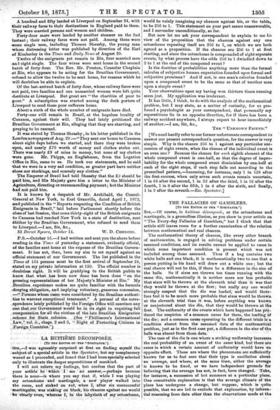lied) LA HUITIEME DRCOMPOSEE.
%1( ; rfo THE NDITOE OF THE "SPECTATOR..') was agreeably surprised at first on finding myself the subject of a special article in the Spectator, but my complacency waned as I proceeded, and found that I had been specially selected only to illustrate the deeper superstitions of mankind.
I will not relieve my feelings, but confess that the part of your article to which I see no answer,—perhaps because there is none—is where you say that if, while I was playing my octoscheme and martingale, a new player walked into the room, and staked on red, when I, after six unsuccessful martingales, was staking on black, his chances against me would be clearly even, whereas I, in the labyrinth of my octoscheme,
would be vainly imagining my chances against his, or the table, to be 256 to 1. This statement on your part seems unanswerable, and I surrender unconditionally, so far.
But now let me ask your correspondent to explain to me his view of the proposition that the chances against any one octoscheme repeating itself are 256 to 1, on which we are both agreed as a proposition. If the chances are 256 to 1 at first starting, and since the octoscheme is compounded of eight separate events, by what process have the odds 256 to 1 dwindled down to 2 to 1 at the end of the compound event ?
Is the doctrine of probabilities anything more than the formal calculus of subjective human expectation founded upon formal and subjective premisses? And if not, is one man's calculus founded upon a compound event to be the same as that of nnother man upon a simple event ?
Your observations upon my having won thirteen times running seem just. My application was irrelevant.
It has little, I think, to do with the analysis of the mathematical problem, but I may state, as a matter of curiosity, for so pro- found a psychologist as your correspondent, that personally my superstitions lie in an opposite direction, for if there has been a railway accident anywhere, I always expect to hear immediately of another.—I am, Sir, &c.,
THE "UNKNOWN FRIEND."
[We need hardly refer to our former unfortunate correspondent to answer our present correspondent's question, for the answer is very simple. Why is the chance 256 to 1 against any particular suc- cession of eight events, when the chance of the individual event is an even one ? Because the chance for each eighth element of the whole compound event is one-half, so that the degree of impro- bability for the whole compound event diminishes by one-half at each of the eight steps, if each step falls out according to the prescribed pattern,—becoming, for instance, only 1 in 128 after the first success, when only seven such events remain uncertain, 1 in 64 after the second, 1 in 32 after the third, 1 in 16 after the fourth, 1 in 8 after the fifth, 1 in 4 after the sixth, and finally, 1 in 2 after the seventh.—En. Spectator.]


































 Previous page
Previous page